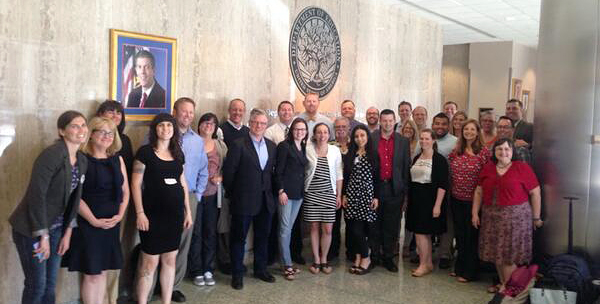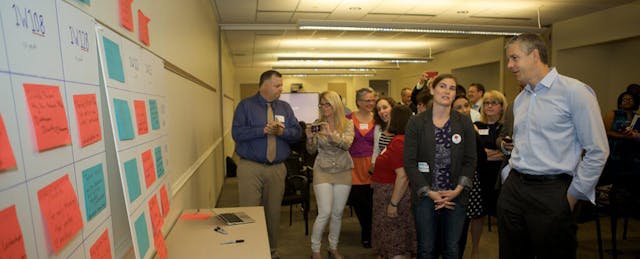Edcamp, an “unconference” event run by educators for educators, is known for its scrappiness and lack of structure and organization.
They’re usually held at schools during off-hours. But on June 6, 2014, Edcamp found a home in the most formal of venues: the U.S. Department of Education headquarters in Washington, D.C. Over 50 educators “came from countless states, on their own dime, to come to Edcamp U.S. Department of Education,” shares Kristen Swanson, Edcamp co-founder and senior educational research leader at BrightBytes. “What incredible ownership and passion for learning!” she commented.
The seeds were planted earlier this year at SXSWedu, where Adam Bellow (former educator and CEO of EduClipper) and Tom Whitby (#edtechchat founder) approached Richard Culatta, executive director of the US Department of Educational Technology, about launching Edcamp White House. Culatta embraced the concept; a quick call was made to Swanson and wheels were set in motion. The White House presented too many security complications as a venue, so the event was moved to the U.S. Department of Education.
Registration opened on March 4, 2014. Within a day, over 1000 educators had submitted their names into the lottery for the 50 available spots. Many of these educators had organized or participated in one of the 500 Edcamps that have occurred over the past 4 years. Key organizer and liaison on the U.S. Dept. of Ed. side, Emily Davis, shared how impressed other staff members were by the numbers and commitment of the teachers who wanted to participate. (Davis serves as the Ambassador Fellow to the U.S. Secretary of Education.)
“Wait, how many teachers applied?” asked several astonished staff members. “And they’re paying their own way?” Yes they did. And some educators like Brendan Murphy even took vacation days to come.
For those lucky 50, the trip was well worth it. Secretary of Education, Arne Duncan popped in for a surprise visit. As did Ruthanne Buck, one of Duncan’s senior advisors, who sat in a few sessions and chatted with teachers during lunch. Other Dept. of Ed. staff members also joined conversations throughout the day.

Hot Topics
All Edcamps begin with a quick overview of how the day works, after which attendees collectively build a schedule of sessions based on what participants want to learn from one another. People sign up to be facilitators for sessions, and participants choose where they want to go.
Here's the full schedule of topics and notes created by participants at this Edcamp. Edcamp co-founder, Dan Callahan, led a discussion that tackled policy issues. Fellow Edcamp co-founder Mary Beth Hertz shared multiple resources for creating a Makerspace--from a closet with construction paper, scissors, glue and some glitter to a fully powered large-space setup. Tom Murray and Joe Mazza’s session created a buzz around using Voxer as a way to stay in touch.
Several key messages came through:
- Learning comes first, then the tech;
- Educators must share success stories so that they are shaping the larger national narrative and to help each other form best practices;
- Professional development must continue to become more personalized; (EdSurge agrees--check out our Guide to Professional Development.)
- Connected educators are relying more on their extended networks, and they want to know how to bring over more educators;
- Teachers are leaving the field because they’re overwhelmed and find it difficult to innovate within the existing structures. Even a few of the teachers and administrators there had recently chosen to leave their district positions because they felt they had limited opportunities and were frustrated by their desire to innovate not being supported.
Stacey Roshan, a participant and Bullis School math teacher, had more to say about this last point on her blog, where she reflected on the event:
“Could we reward teachers for exceptional work with time? Time to innovate, create, connect, share, and collaborate. A type of rotating, lead teacher position, perhaps. Maybe this teacher would teach 3 classes instead of 5 for a year, and be tasked to mentor other teachers and bring new ideas into their classrooms....Maybe this teacher would best be served by taking a sabbatical. This time could be used to develop a new class or new idea, to travel and see best-practices in action, to connect with teachers/programs/and companies, to share stories highlighting great things that are happening in our classroom, those around us, or those far away. Creativity and innovation require time, after all. And we all deserve to be recognized for great work.”
Participants in these discussions recognized that there weren’t easy solutions and expressed appreciation to the U.S. Department of Education for opening their doors to hear their ideas. “Seeing the Department of Education embrace Edcamp couldn't be more exciting,” shared Swanson. “This shows that the Department is listening to educators and seeking innovative, sustainable solutions to help all teachers improve.”
The Edcamp Foundation and the U.S. Department of Education have already begun talking about a larger venue where more teachers can participate next year. Can’t wait until then? Check out EdSurge’s Edcamp on June 24, or organize an Edcamp in your own town.


